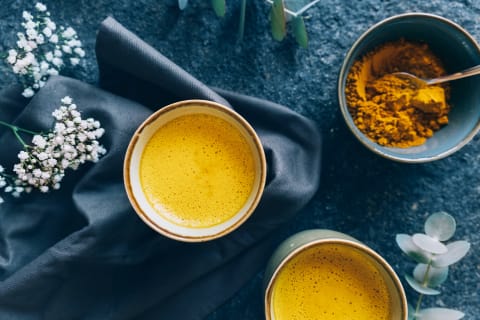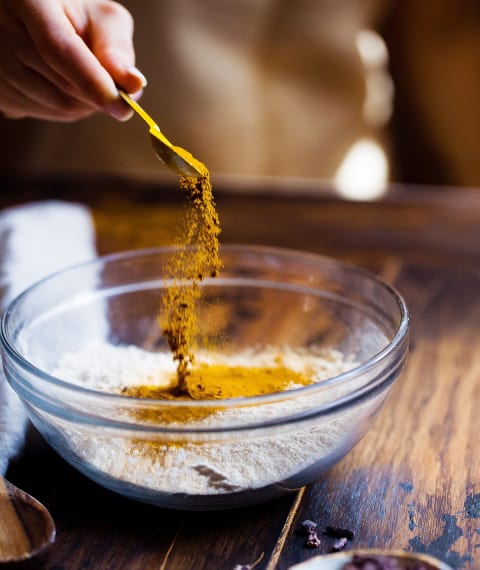This ancient Ayurvedic root, which is a cousin to ginger, is native to Southeast Asia and sometimes called “Indian saffron” because of its beautiful golden color. It also gives curry powder (and just about any other food it’s added to) its yellow pigment. Maybe you have a few questions around turmeric, like: Is taking a turmeric supplement better than simply adding it my meals? And what the heck is the difference between turmeric and curcumin? We’ll answer these, and give you a list of turmeric benefits to boot! Read on to learn if turmeric and curcumin are created equal, whether a daily turmeric is right for you, and eight ways turmeric can boost your health and wellness.* That said, adding the powerhouse herb to your day-to-day diet is a fun way to flavor your dishes and sprinkle in some health benefits, too. So, we pose this question: Why choose just one when you can have both?! To support her own health, physician and Ayurveda expert Avanti Kumar-Singh, M.D., likes to take a turmeric supplement and include turmeric in her diet: “For targeted support, I prefer a supplement that is pure and contains black pepper for greater bioavailability. For everyday support, maintenance, and flavor, I prefer cooking with turmeric powder or fresh turmeric root,” she shares. A daily turmeric supplement can help you get all of these health perks, but I’ve also included some culinary inspiration for each of turmeric’s benefits—so you can support holistic well-being with supplementation and food alike.* (A win for your whole-body health AND taste buds!) Here are eight ways turmeric can support holistic health: Curcumin helps modulate inflammatory pathways in multiple ways, which is why turmeric is such a powerful botanical for whole-body health.* According to a 2011 scientific review from Natural Product Reports, curcumin directly binds to pro-inflammatory cytokines3 (e.g., TNF alpha, IL-1 beta, and IL-6—to name just a few) to inhibit their expression.* In addition to regulating that activity of pro-inflammatory mediators directly, curcumin also interacts with transcription factors4—such as nuclear factor kappa B—to influence gene expression and effectively turn pro-inflammatory genes “off.”* Anti-inflammatory salad dressing To make it easy to add in, use turmeric in a go-to salad dressing. I love to whisk together white miso paste, tahini, apple cider vinegar, and turmeric for a simply delicious and powerful dressing (check out the full turmeric salad dressing recipe here). Turmeric’s antioxidant properties also benefit our appearance by protecting the skin from free radicals6, like environmental pollutants and other modern toxins.* So, yes—turmeric kicks free radical butt, and helps support overall oxidative balance.* Antioxidant-boosting bevvy Add a teaspoon of turmeric to your favorite green juice or smoothie for an antioxidant boost. (You can find piperine alongside full-spectrum turmeric in mbg’s turmeric potency+—plus ginger root extract, which is another superstar botanical for immune support).* One of my favorite ancient Ayurvedic remedies is an immune-supporting tea with turmeric, ginger, and black pepper. Immune-boosting turmeric tea Add one teaspoon of turmeric to 12 ounces of water and bring to a boil. Take the water off the heat and add 1/4 teaspoon each of ground ginger and black pepper. You can also make this tea into golden milk by using coconut milk instead of water. Pro tip: Since curcumin is fat-soluble, consuming it with a fat-containing food or beverage helps you absorb it more effectively. It’s also beneficial to the musculoskeletal system as a whole: In a 2021 Oxidative Medicine and Cellular Longevity review, turmeric supplements were found to help improve muscle performance and promote healthy muscle recovery10.* Joint support smoothie I recommend a smoothie packed with soothing, anti-inflammatory superfoods to my clients struggling with suboptimal joint health. My go-to combo is frozen wild blueberries, roasted or steamed beets (another antioxidant-rich food11), and turmeric. If you want to make it a meal, add your favorite plant protein. Heart-healthy granola Reap turmeric’s cardioprotective benefits in a delicious way by cooking it into a fiber-rich, whole-grain dish—like this turmeric, apricot, and pistachio granola. Gut-soothing kitchari Kitchari is a cleansing Ayurvedic dish that’s traditionally made with split mung beans, white basmati rice, and various veggies and spices. This green kitchari recipe is packed with yummy spices (like cumin, coriander, ginger, and yes—turmeric) and features a diverse list of ingredients to support a healthy gut microbiome. Evidence from animal studies indicates that curcumin may influence the production of mood-boosting neurotransmitters16 (i.e., serotonin and dopamine) as well, though research in this field is still ongoing.* Mood-boosting savory oats Because tryptophan is a precursor to serotonin, getting enough of this amino acid can also help support a stable mood. While it’s mostly found in animal protein, oats are a great plant-based source. (Savory oatmeal, anyone?) My go-to savory oats spice combo is turmeric, ginger, black pepper, paprika, and garlic powder. Add an egg for staying power and veggies for extra nutrients, and you’ve got a meal! In addition to mood support benefits, BDNF also plays a key role in maintaining cognitive function later in life17, which means increasing levels of BDNF is one more way curcumin can help promote brain health as we age.* Brain longevity breakfast Turmeric goes great with eggs (another excellent brain food). Shake some into a veggie omelet or scrambled eggs to support your cognitive function throughout the day—and be sure to add lots of veggies for added phytonutrients! Look for a bioavailable form of turmeric that will allow your body to absorb as many curcuminoids as possible so you can optimize your health benefits. A supplement with full-spectrum turmeric root extract and polar-nonpolar-sandwich (PNS) technology (like mbg’s turmeric potency+) enhances bioavailability tenfold compared to common turmeric forms ensure you’re getting the most out of turmeric’s many perks.† When adding turmeric spice or root to your meals, always make sure to add black pepper to enhance its bioavailability. For targeted health support, a daily turmeric supplement like mbg’s turmeric potency+ with PNS technology and piperine from black pepper extract for enhanced bioavailability is a smart, effective way to ensure you’re reaping all amazing health benefits this legendary herb has to offer.





